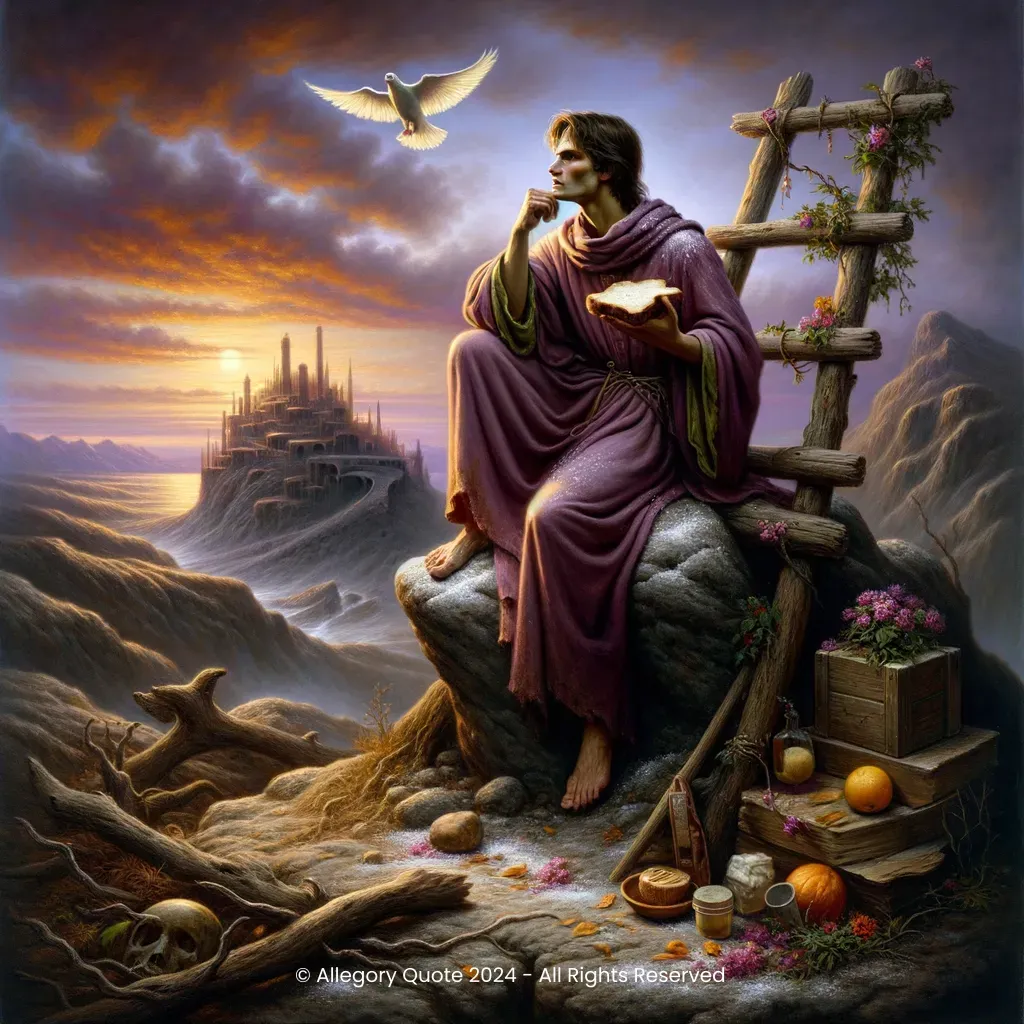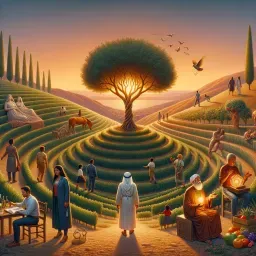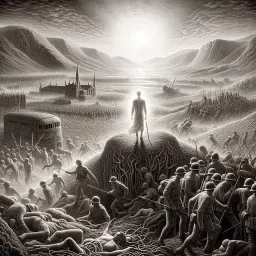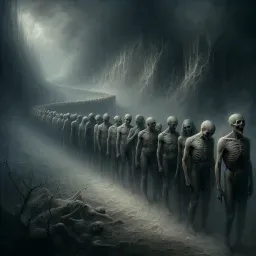”You will taste how salty another's bread is,
and how hard it is to tread another's stairs up and down“

0
0
0
0
- Meaning
- The phrase evokes the pain and bitterness of exile, an experience Dante himself lived through. The "another's bread" and "another's stairs" are metaphors for the dependence on others and the difficulties of adapting to life away from one's home and community. The salty taste of another's bread emphasizes the bitterness of loss and discomfort, while the stairs symbolize the challenges and constant changes the exiled must face. Taken together, the phrase represents the lament of those forced to live in precarious and lonely conditions, far from their loved ones and securities.
- Allegory
- 1. **Man in medieval clothing:** represents Dante Alighieri, the author of the original work and a symbol of the exiled. 2. **Rocky hill and distant city:** the hill symbolizes the physical and emotional distance and separation from the homeland. 3. **Bread with salt:** represents the metaphor for the bitterness and difficulty of living away from home. 4. **Wooden stairs:** symbolizes the difficulties and precariousness faced by the exiled in depending on others. 5. **Twilight sky:** colors that communicate a mix of hope and sadness, reflecting the emotional state of the exiled. 6. **Wild nature:** metaphor for the uncertainties and tumultuous feelings experienced. 7. **Dove and budding flowers:** symbols of hope, distant affections, and the possibility of overcoming adversity through resilience and hope.
- Applicability
- The meaning of Dante's phrase can be applied to modern life in various ways. First and foremost, it represents a reflection on the difficulty of being away from one's home and habits. It is a universal theme that can be felt by anyone living far from their native land for work, study, or necessity. Additionally, it indicates the value of independence and self-sufficiency, and the difficulty of depending on others. Finally, the phrase can serve as consolation for those facing hardships, reminding them that these difficult moments are not unique and have been faced and overcome in the past.
- Impact
- This phrase has had a lasting impact on literature and culture. The "Divine Comedy" is a cornerstone of world literature, and Dante's reflections on personal pain, such as that of exile, have resonated with readers of every era. The phrase is often quoted to express the pain of living far from home and to discuss the difficulties of life away from one's roots. It has influenced not only literature but also philosophy and popular culture, becoming a symbol of the experience of exile in a broad sense.
- Historical Context
- Dante Alighieri was exiled from Florence in 1302 due to political conflicts. The "Divine Comedy" was written between 1308 and 1320 and reflects many of the poet's personal experiences, including the bitterness of exile and the challenging condition of life in exile. The phrase in question reflects this context and makes evident the rawness and harshness of the life of someone forced to live far from their homeland.
- Criticisms
- There are no significant criticisms of the phrase itself, but Dante's work has been examined and interpreted from many different perspectives over the centuries. Some modern viewpoints might consider Dante's vision of exile as too pessimistic or limited, especially in light of contemporary experiences of exile and migration, which can present a broader range of experiences and feelings. However, the authenticity of Dante's sentiment is rarely contested.
- Variations
- There are cultural variations on this theme that appear in various proverbs and quotes, expressing the pain and difficulty of exile or living far from one's land. For example, many cultures have expressions that underline the bitterness and challenge of depending on others or living in foreign lands. In some cultures, the idea of hospitality and support to strangers is emphasized as a fundamental value to alleviate these difficulties.
-

Beyond the sphere that widest orbit swings, passes the sigh that leaves my heart below.
-

There is no other life; why don’t you give your whole heart to this one?
-

Even the darkest night will end, and the sun will rise.
-

Every tongue should confess that Jesus Christ is Lord, to the glory of God the Father.
-

In the midst of chaos, there is also opportunity.
-

You cannot reach the dawn without passing through the paths of the night.
-

There the dreadful Erichtho writhed, who summoned back the shadows to their bodies.
-

Prophet of doom.
-

I saw such a long throng of people, I would not have believed death had undone so many.
-

He had already reached the place where the roar of water falling into the next circle could be heard, similar to the buzzing of beehives.
No Comments